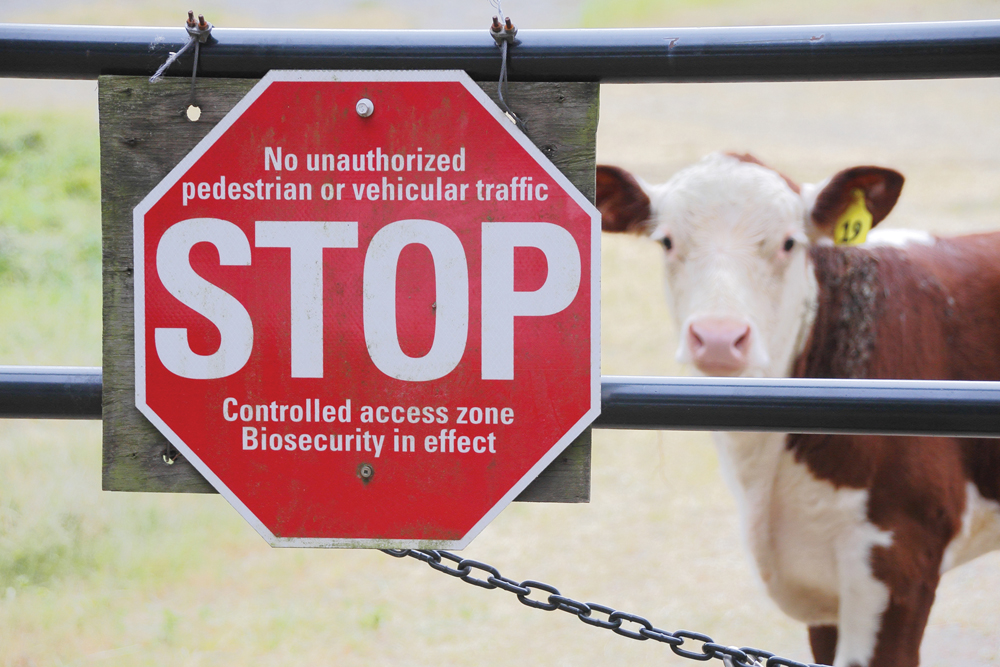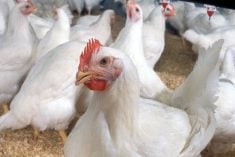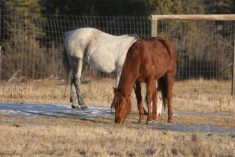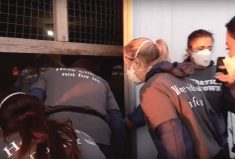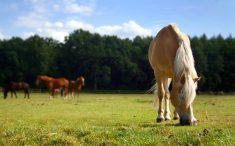The photo, texted by a tipster to a Co-operator reporter this fall, showed a dead pig of about market size.
The image was taken outside a barn in southeastern Manitoba after the tipster gained permission to access the property by claiming to look for a lost dog, they said. The tipster claimed there were 15-20 hog carcasses filling two dumpsters.
They told the reporter they were concerned about the number and that the bodies had been left outside.
Read Also
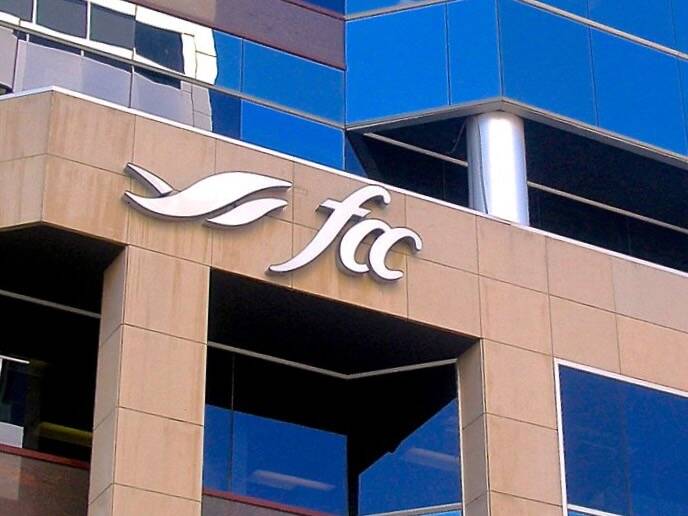
Farm Credit Canada forecasts higher farm costs for 2026
Canadian farmers should brace for higher costs in 2026, Farm Credit Canada warns, although there’s some bright financial news for cattle
Those in the livestock business, in which deadstock is a fact of life, would probably be less worried.
One to two per cent mortality on a pig farm is routine, said Stephane Beaudoin, founder of Gestbeau, a Quebec firm that audits barns and abattoirs for animal welfare standards.
Farmers could follow the National Farm Animal Care Council’s guidelines to the letter and animals could still die, Beaudoin added.
“That’s just nature. … For whatever reason, there might be an animal in the herd that is more susceptible to disease. It’s not because there’s not the proper care and the proper equipment on the farm.”
Why it matters: Livestock producers say activists on farms bring disease risks and stress to animals and to farmers themselves, but keeping them out leads to accusations that the farm is hiding something.
The number of farms in Canada has declined significantly in recent decades – by 32.2 per cent between 1991 and 2021, according to the Census of Agriculture. As of 2021, Statistics Canada reported the farm population made up only 1.6 per cent of Canadians.
The widening divide between rural and urban shows in competing campaigns by the meat sector and animal rights groups to reach consumers’ hearts and minds.
Animal rights activists have become a sort of boogeyman for the sector, driven by high-profile incidents in which they enter barns, purportedly to record conditions that would otherwise be hidden from the public.
In 2014, undercover videos showing dairy cattle being beaten did lead to animal cruelty charges against one operation in Chilliwack, B.C.
More recent incidents have frustrated producers with what they say are unfounded claims of animal mistreatment. Farmers say they have limited ability to defend their operations without getting a public relations black eye from a population base increasingly separated from the farm.
In 2019, residents of the Jumbo Valley Hutterite Colony in Alberta went out for morning chores and found a few dozen activists occupying their turkey barn. After RCMP officers arrived, protesters and media were allowed to tour the colony’s barns and the activists took five turkeys when they departed. Three people were charged in connection with the incident.

A limited internet search shows at least 16 protests or acts of civil disobedience between 2012 and 2023 that involved activists breaking into or interfering with farms and slaughterhouses.
These included several ‘sit-ins’ similar to the Alberta turkey farm, or cases where activists snuck onto premises to get video or pictures of conditions inside. In other cases, activists released animals.
Some incidents led to arrests. Amy Soranno and Nick Schafer, who led a group to break into an Abbotsford, B.C. hog farm in 2019, received jail sentences for breaking and entering and mischief, according to an Oct. 2022 article from the National Observer.
Soranno, who livestreamed the event, told the National Observer, “Our goal was to get mass media attention, not only on Excelsior [the farm’s name], but the fact that this farm is representative of the entire industry.”
According to the National Observer, the video stream captured sows “confined to filthy gestation crates — metal cages too small for them to turn or scratch themselves.”
Gestation crates, while not illegal, are being phased out. Earlier this year, the Manitoba Pork Council estimated that about 60 per cent of sows in the province are now in group housing.
Trading blows
The conflict has played out on billboards, radio waves and awareness campaigns with both sides targeting the urban audience.
Industry groups have spent significant money and effort on ads saying that milk comes “all from a good place,” and that their pork is “Good for me. Good for MB,” to cite a few recent examples. Films like “Guardians of the Grasslands” and a recent livestream of pasture ambience seek to show livestock sectors as drivers of ecological benefit and biodiversity.
There are counters, such as a string of billboards that appeared around Winnipeg this summer. Erected by the Winnipeg Humane Society, the billboards were part of the organization’s “Stop the Suffering” campaign and took aim at the pork sector’s treatment of animals.

“We’re not alone. They launched a similar campaign in February against dairy and another campaign against eggs in May,” said Manitoba Pork general manager Cam Dahl at the time.
Most Canadians aren’t as polarized. In a survey, 68 per cent of Canadians agreed or strongly agreed that they’d have no problem consuming meat, milk and eggs if they came from humanely treated animals, according to the Canadian Centre for Food Integrity’s 2023 research report.
However, only 46 per cent agreed or strongly agreed that animals were humanely treated and nine per cent overtly disagreed. Of those surveyed, 26 per cent had looked for information on the topic.
CCFI also found that price was the highest object of concern about animal products.
New laws
Activist incidents have led to a rise in biosecurity and trespassing legislation, hailed by a wary ag sector as a much-needed measure and panned by activists as ‘ag-gag’ law that will reduce accountability.
Manitoba, Alberta and Ontario have all passed versions of the legislation, while a federal bill (Bill C-275), is working its way through Parliament. If passed, the bill would impose steep fines or jail time for those who enter biosecure areas without permission.
“[Farmers] are being targeted and attacked for what they do … there’s no one out there standing up for them,” Alberta MP and Bill C-275 sponsor John Barlow told the House of Commons agriculture committee in late September.
There is pushback.
This fall, animal rights advocates go to court in a bid to strike down Ontario’s rendition.
“Ontario’s Ag-Gag law is an unconstitutional attempt to stifle free expression, hide widespread animal abuse, and prevent people from knowing where their food comes from,” said advocacy group Animal Justice in an Oct. 23 release.
It said it was planning a rally outside the courthouse on the first day of proceedings.
Animal Justice filed the lawsuit in 2021, alongside Manitoba journalist Jessica Scott-Reid and photographer Louise Jorgensen.
Farm impacts
Those in the agricultural industry argue that the idea of activists as camera-wielding heroes does not consider their detrimental effects on the very animals they claim to protect and on the mental health of farmers. It also ignores the value of accountability systems already in place.
During her testimony to the House of Commons agriculture committee during Bill C-275 deliberations, Do More Agriculture executive director Megz Reynolds read comments from sheep farmer and YouTuber Sandi Brock.
“My comment section isn’t always so nice,” Brock said, via Reynolds. “There is always a gnawing in my gut that one day one of those negative commentors will show up at my front door.”
Uninvited visitors also raise the spectre of disease. Outbreaks of porcine epidemic diarrhea in Manitoba, for instance, led to much stricter biosecurity across the sector, including a crackdown on all types of traffic in and out of barns.
In terms of accountability, Dahl said animal welfare codes, developed and periodically updated by the National Farm Animal Care Council, are law in Manitoba. Hog farms are audited and barns are closed to keep animals from getting sick, not to keep things hidden.
“That’s something that we need to talk about more,” he said.
Escalation
It’s not unreasonable to expect farmers to defend against activists who invade their farms, said Rob Danisch, a professor of communications at the University of Waterloo, but nor is it unreasonable to expect activists to respond if threatened with stiff fines or jail time.
In such a polarized issue, he said, a strong action tends to trigger an equal and opposite reaction.
Danisch explained an experiment he does with his students, in which they have two conversations with their parents. In one, they make an exaggerated claim, such as “you’re the worst parent!”
“The parents push back hard,” Danisch said. “It activates the polarization cycle.”
When the students make specific and limited arguments, “that almost always triggers a kind of rational, deliberative process,” he said.
“Laws that are really narrow and tightly focused … can often create more deliberate and rational responses, instead of these kinds of laws that respond to hyperbole.”
Anti-abuse or anti-livestock?
Barlow’s comments to the House ag committee this fall echoed a common perception among livestock sectors: that animal rights activists ultimately want to end animal agriculture.
One group, Manitoba Animal Save, says on its website: “Our overarching goal is to shut down slaughterhouses and turn them into sanctuaries, in our generation.”
Another, Mercy For Animals, states, “Our mission is to end industrial animal agriculture by constructing a just and sustainable food system.”
Other groups don’t go that far.
“The focus of our work is just to get laws in place protecting animals on farms that are in line with societies’ expectations,” said Camille Labchuk, executive director with Animal Justice. She said that, for both welfare and climate-related reasons, her group would like to see animal agriculture drastically curtailed.
Despite industry contentions that there are accountability systems in place, Labchuk said livestock sectors have “a strong history of refusing to budge on the major issues.”
“They occasionally will transition away from them, but typically only after a lot of pressure and a lot of attacks against people who are pushing for these changes.”
Labchuk said she would like to see more collaboration between the industry and animal welfare groups, and she views the latter as the voice of mainstream Canadians. Greater regulation of animal care codes and regular government inspection of farms, perhaps even cameras on farms, are actions she’d like to see.
Dahl doesn’t like that last idea, on the grounds that they’d be invasive to workers. However, he agreed the industry could do a better job of transparency and “just communicating what we do.
“There isn’t a good understanding from everyone in the public that there are regulations, there are standards … these are improving over time, that they’re science based.”


